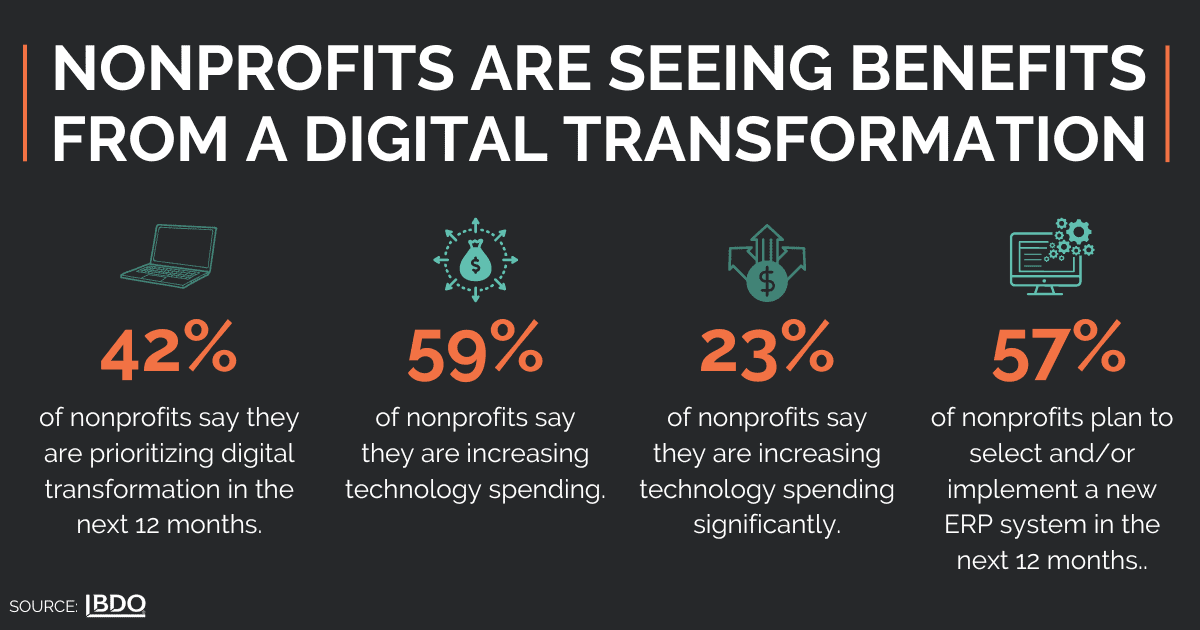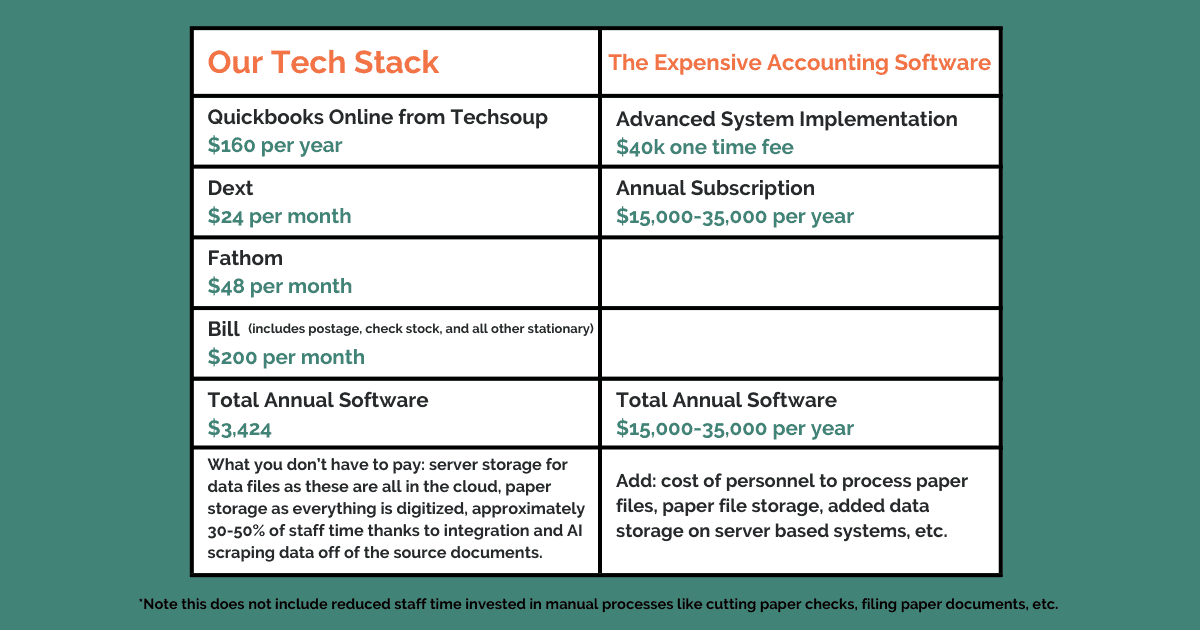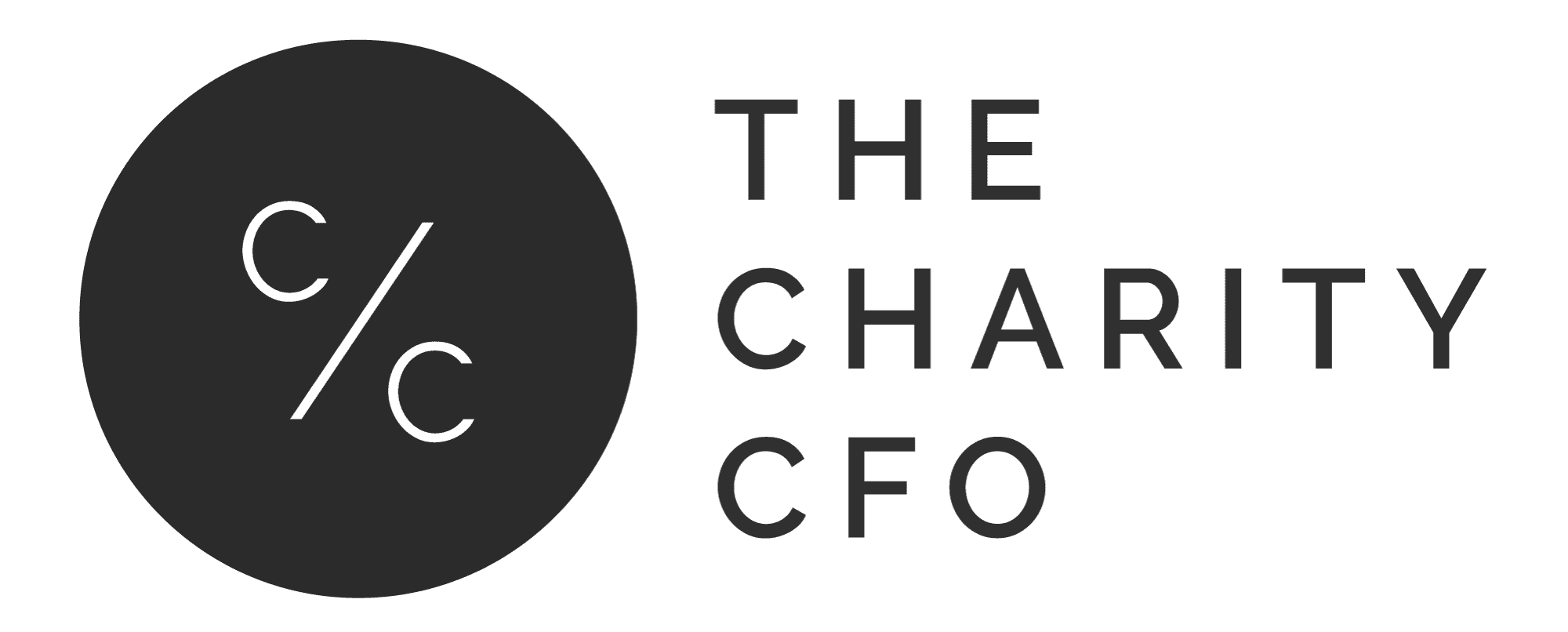Case Study: Financial Clarity with Modern Nonprofit Accounting Software
For nonprofit organizations, accounting comes with a lot of complexity. Categorizing transactions, reporting income, and meeting compliance requirements can be overwhelming.
In this case study, we’ll explore real stories of nonprofits who have transformed their organizations by using technology to streamline their financial infrastructure.
Want to download a PDF version of this case study? Click here to fill out a form and we will send you a copy.
Instead of slow, paper-driven, backward-looking accounting, these organizations are moving quickly through digital integrations allowing them to focus on their core responsibilities.
Let’s meet these organizations.
About The Charity CFO
The Charity CFO is an accounting firm specializing in serving nonprofits through outsourced accounting and fractional CFO services.
We know what a nonprofit goes through each day, and we utilize technology to simplify our clients’ accounting processes. This case study is the story of how The Charity CFO has helped organizations to navigate accounting and create simplicity instead of chaos.
About Vermont Adult Learning
Joe Przyperhart, M.S. is the Director of Programs and Interim Co-Executive Director at Vermont Adult Learning. Vermont Adult Learning works for the day when all Vermonters are prosperous and have the life skills and knowledge to achieve success in their careers, family, and community.
As stated on their website, “Vermont Adult Learning’s mission is to create an innovative, inclusive, and equitable learning environment that provides personalized opportunities for education and career development for Vermont residents by building relationships, strengthening communities, and fostering lifelong learning.”
About Connections to Success
Brandi Jahnke is the CEO of Connection to Success. According to their website, “At Connections, we provide a comprehensive network of services and support to help people living in poverty become economically self-sufficient. Our model, with lifelong mentoring at its core, delivers evidence-based results and impacts all areas of a person’s life. This is built upon our mission and values.”
Summary
For each of these organizations, Connections and Vermont Adult Learning, their growth resulted in increased complexity in their finances.
Paper checks, spreadsheets, and bulky expensive software were all patched together in a confusing system.
But then through working with The Charity CFO, and moving to a completely new, modern technology stack, their accounting is now fast, reliable, and helpful for Brandi and Joe as they lead their respective organizations.
To learn more about how The Charity CFO can use technology to streamline nonprofit accounting, you can set up a consultation here.

The Goal in Your Nonprofit Accounting Software
Before stepping into the details of how these organizations’ accounting is set up, let’s start at the foundation level.
What is the actual goal in a nonprofit accounting setup? Or, put another way, What does the ideal accounting system look like?
Compliance
First and foremost, a good accounting system is going to make it easy to stay compliant. This means easily being able to report your income and expenses and giving all leaders confidence in their reporting.
As an example, you also need to have segmented reporting to assign dollars spent to funders and grants. The easier it is to dive into transactions, the easier it will be to report on where the money is coming from, where it’s going, and to audit what’s happening.
Understanding
Once you’ve established confidence in your reporting requirements, the next step is truly understanding what’s going on with the money in the organization. To lead an organization, you must be able to look forward and make informed decisions.
You also need the ability to track and make sure, for example, that all of your pledged donations were collected. Without effective tracking of your cash flow, you’ll be making reactive decisions and may catch problems when it’s already too late.
Scalable
While accounting is not known for its simplicity, it doesn’t have to be overwhelming. The goal in an ideal world is for these things to happen in the background, without creating a big burden for the leaders.

The Problem for Nonprofit Accounting Software
For Brandi and Joe, they had the same goal of an ideal accounting system. They wanted to stay compliant, see their data, but be able to focus on their various responsibilities.
The problem was, accounting came to the forefront because it was overwhelming and time-consuming.
For Joe, Vermont Adult Learning has continued to grow and the amount of money to track became substantial.
“We had an expensive nonprofit-specific software tool, and I was never sure about where our money was going or coming from.” Joe explained, “Making things more difficult is we have a team in various regions and it’s very difficult for us to all be transparent about what’s going on financially.”
With different regions, Vermont Adult Learning needed a way to pull data quickly into a single source of truth. Before working with The Charity CFO, most of their time was spent looking backward and double-checking information to make sure their reporting was correct.
With Brandi and Connections to Success, the story was similar. They also had a nonprofit-specific accounting software tool, and a lot of slow, manual processes which included:
- Manual checks which had to be approved
- Emails with spreadsheets to approve bills
- No process in place for capturing receipts
- Time-consuming for administrative staff
All of this, Brandi explained, led to a lot of back-and-forth and frustration.
“We didn’t have anything automated, which led to a lot of communication and not understanding where things stood,” Brandi explained. “I knew we needed a different process if we wanted to stay organized.”
A Better Way to Organize Nonprofit Operations
If you are in a nonprofit dealing with similar frustrations as described above, don’t worry – there is a better way.
It’s time for nonprofits to rethink their accounting practices and gain control over their numbers so they can spend their energy where they are most valuable.
For Joe, the transformation in accounting with The Charity CFO could be described as going from confusion to clarity:
“I had always felt a little unclear about the finances,” Joe explained. “Where is the money? What is it being spent on? Are these expenses appropriate? Now it’s much more clear, visible and transparent. Even with multiple locations, we can keep the information organized and see exactly what’s going on.”
Brandi went through a similar transformation at Connections, to the point where their nonprofit board is thrilled with the quality of information contained in the monthly financial reports.
“Previously, we didn’t really have a process for finances and were always kind of in the dark,” she said. “Now, having monthly financial reports has been very helpful, and we’re able to drill down on the individual grant budgets and spending. The overall organization is great and we’re looking at our specific budgets regularly. Our board certainly appreciates the monthly financial reports, and we have a much more complete view of the finances than we did before.”
So the question in both of these transformations is, “How did they get there?”
In this case study, we will break down the exact tools and setup these organizations have used to get organized, and what it takes to make this change. To break it down, both organizations went through a process that included:
- Free-flowing data through integration into the general ledger system
- Easy to produce monthly financial reporting
- Easy view of Accounts Payable and Accounts Receivable through software tools
- Paperless so there is an easy audit trail, and nothing falls through the cracks
- Minimal data entry
- Timely feedback on budgets so there are no surprises
Now, let’s dive in on how they got there.

The Nonprofit Accounting Tech Stack
Through the help of The Charity CFO, these organizations ended up with a specific tech setup that allowed them to maximize efficiency. Here is the overview:
- QuickBooks Online: Accounting database
- Dext: Tracking receipts, deposits, and other transaction-level documentation
- Bill: Managing payables and issuing checks
- Fathom: Reporting and dashboards
All of these tools integrate together, feeding into and working with QuickBooks Online so there is a quick reconciliation of the flow of money in and out of the organization.
Let’s take a deeper look.
QuickBooks Online
QuickBooks Online is simply a database for all of your accounting data. Like any other database, you want a system that is easy to use, scalable, and can accommodate the organization’s current financial activities. We believe that QuickBooks Online is the best system for most small- to mid-sized nonprofit organizations, striking a balance between effective and economical.
Some may believe that a nonprofit is better off with an accounting system that is specifically designed for nonprofits, such as Abila MIP or Blackbaud Financial Edge. While it is smart marketing to label these platforms as nonprofit accounting systems, the reality is most systems can accommodate nonprofit accounting. In fact, in both Joe and Brandi’s case, they found that QuickBooks Online served their organizations far better than the nonprofit-specific software they had been using before.
QuickBooks Online boasts 3 significant advantages over its competitors: 1) it’s cloud-based, 2) it’s ubiquitous, and 3) it can integrate with anything.
QuickBooks Online is a cloud-based system, which means multiple users can securely access the system, simultaneously, from across geographical boundaries. There is no need for a server or IT infrastructure; the system can be accessed from any modern web browser. We all know that the way we do business is moving to the cloud, but many accounting systems are still not cloud-enabled.
QuickBooks Online may be the most widely used accounting system in the world today. As such, most bookkeepers, accountants, and CPAs have had at least some experience with the system. This allows nonprofit organizations to keep their software support and training costs low. We’ve seen organizations spend tens of thousands of dollars per year just for consultants to provide training to their accountants on how to use their systems. With QuickBooks Online, this is rarely necessary. Where is this especially comforting? If you have a change in your accountant or bookkeeper and are looking to hire a replacement, chances are that most experienced accountants have worked with QuickBooks. And, if they haven’t, there is essentially unlimited free training out there – including a free certification program that comes with the software.
Finally, QuickBooks Online can integrate with just about any system you can imagine. The Charity CFO’s primary tech stack, which includes Dext, Bill, and Fathom, will all integrate seamlessly and flawlessly with QuickBooks Online. QuickBooks Online will also integrate with almost every bank and credit card in the United States, allowing us to automatically ‘feed’ bank and credit card transactions into the system to enable more efficient and real-time bookkeeping.
For Joe, the online aspect was a huge help with their different remote departments. Their organization has payments and donations coming into and out of various offices across the state of Vermont, but with QuickBooks Online, all of that data can be easily consolidated into a single source of truth.
Dext
Dext serves as a repository for transaction-level documentation. Nonprofits must have a system to collect and store copies of receipts, bills, and deposits to stay compliant. Imagine Dext being your virtual mail-in-box for all things that go to your accountant. When in doubt, put it in the Dext folder.
Dext utilizes an easy-to-use mobile app that allows any employee user to easily snap a picture of a receipt or document and provide the correct coding (GL account, department, and funder) to ensure that every transaction is accurately recorded and the relevant documentation is digitally stored in an accessible way.
Dext also integrates with QuickBooks Online, so all documentation that is uploaded through the app ultimately gets synced to and attached within QuickBooks Online. This allows us to always be audit-ready, and it eliminates the need to maintain physical folders with copies of receipts, deposit slips, etc.
Sure, other software solutions do something similar. We pick Dext because it offers the multi-dimensional accounting functionality to code to the account, department, grant, etc. Furthermore, it is easy to use, integrates seamlessly within QuickBooks Online, and is affordable.
Bill (formerly known as Bill.com)
Bill is a system that manages the entire accounts payable cycle in a virtual environment. Bill allows us to upload digital copies of all vendor/contractor bills, and then assign those bills for digital approval. We can even set up rules that enforce the organization’s approval policies; so if a specific individual is required to approve all bills over a specific dollar threshold before payment, we can set up Bill to automatically enforce that rule.
After a bill is entered into the system and approved by the required parties, Bill will issue payment via ACH, if the vendor allows for that. If the vendor requires a check payment, Bill will print and mail a check on behalf of the organization. This eliminates the need for paper, stamps, and envelopes.
The biggest flex from Bill? Addressing the auditor’s concerns when bills are not approved before making payment. We have seen countless issues cited in audits that nonprofits have policies to review and approve bills but they failed to capture those approvals. With Bill, we don’t pay bills unless they are approved. Approvers can log in to an app from their smartphone or on the computer at any location. The final result? We have an easy-to-use system to process bills, capture approval, and get checks out the door much easier – and all virtually.
Of course, Bill also integrates with QuickBooks Online to ensure that the organization always has a timely picture of its bills and payables. Even better? It reduces the need for manual entry of these bills into QuickBooks Online.
Fathom
We are biased with our tech stack, but we recognize there are limitations with some of the solutions. The most frequent objection with QuickBooks Online that we hear is reporting capabilities. It’s true. QuickBooks Online does allow some customization, but most of the reporting is pretty canned. In some cases, we need more advanced reporting for various stakeholders. And, that’s where Fathom comes in.
Fathom is a reporting system that pulls data from QuickBooks Online to generate monthly financial reports and dashboards. The Charity CFO works closely with its clients to understand their unique reporting needs, and we build tailored reporting using Fathom. With Fathom, the possibilities for reporting, graphs, and charts, are virtually limitless!
How Artificial Intelligence (AI) is Impacting Nonprofits
Technology is changing fast, and nowhere is that more evident than the expansion of AI. This topic can be confusing and intimidating, but with the right approach, AI can be a huge boost to efficiency in your firm. Here are just a few ways nonprofits are benefiting from AI:
Grant Writing with AI
Grant writing has always been a technical, labor-intensive exercise that often becomes challenging for smaller organizations.
But with AI, grant writing can become fast and efficient. To learn more, check out this full podcast on grant writing made easy.
AI in your financial tech stack
The accounting software mentioned above incorporates AI for reading receipts, predicting expense categories, and sourcing documents..
The Results of Nonprofit Accounting Software Transformation

This tech stack enabled greater confidence and efficiency for everyone at Vermont Adult Learning.
“Getting into QuickBooks is so much easier than our old system,” Joe explained. “I can run reports myself, and that’s provided a huge benefit. With our expenses, we can approve things in real-time. We have a clear vision of where our money is being spent. I’m catching things that may have been misquoted, and we finally have a review process like I’ve always wanted. Overall, we have a level of transparency that we’ve never had before around our finances.”
Making the Best Use of Resources
One of the biggest challenges in any nonprofit organization is running out of hours in the day. Teams are often understaffed, and many people have to wear multiple hats to keep everything moving.
So it’s crucial to make sure everyone plays to their strengths and maximizes efficiency.
The same is true when managing finances. With accounting, a rough estimate is that about 80% of the work is transactional: entering data, uploading receipts, etc. The other 20% is the high-value, CFO work of analysis and guidance.
The problem is when the transactional 80% work bogs down the staff and doesn’t allow the 20% to happen.
If your administrative staff is overloaded with transactional work, it’s taking them away from other core tasks. If your CFO is overloaded with transactional work, it’s not the best use of their time, and it’s probably too expensive.
So another benefit of using technology is that you can automate a lot of this transactional work, and allow everyone to make better use of their time. Then your CFO can work with the data, and focus purely on higher-value analysis and reporting.

The Right Partner for Implementation
These changes do not happen overnight, and hearing these stories, it may seem daunting to go through a transformation like this.
However, as both of these organizations have experienced, the change is well worth it, and with the right partner, it can be a smooth transition.
That’s where The Charity CFO comes in. The Charity CFO works as an outsourced accounting services provider and fractional CFO, and we are proficient in both nonprofit accounting and modern accounting tools.
We handle the transition from outdated software to QuickBooks Online and help organize the system for success.
Joe initially had some hesitation about working with an outsourced accounting partner; before engaging with The Charity CFO, Vermont Adult Learning had always had a full-time, in-house CFO or Finance Director. But, after partnering with The Charity CFO, his fears were quickly alleviated.
“I’m very thankful for how The Charity CFO team dug into our finances and came up with the right plan for our team,” Joe said. “They had a level of insight I was just amazed at, and as the relationship has continued, they’ve still been available. We have a deep level of trust, and they have been extremely helpful for us in getting to this point of understanding our accounting.”
For Brandi, the value of her partnership with The Charity CFO became clearest when Connections to Success underwent their next annual financial statement and federal single audit.
“That was amazing this past year,” Brandi said. “We weren’t in the office thumbing through files, asking where certain receipts were. It was smooth and automated. So that was priceless.”
Is your organization dealing with slow, outdated practices for your audits and accounting? Do you want to experience a similar transformation? If so, check out The Charity CFO and set up a free consultation here.






